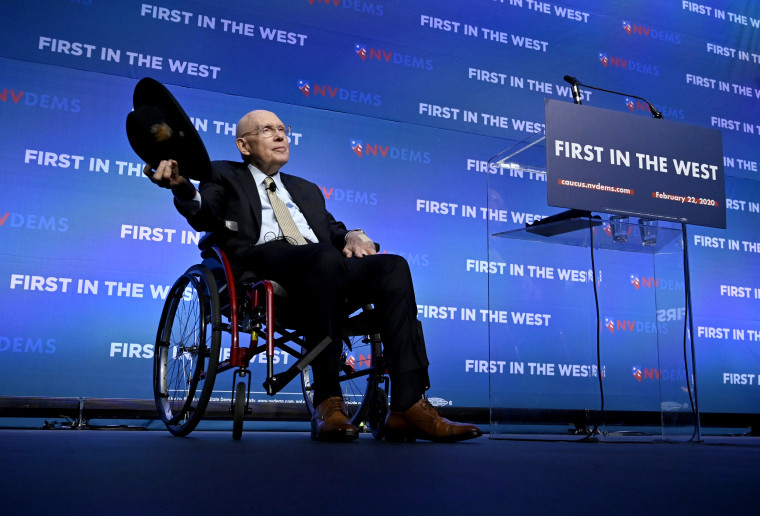LAS VEGAS — Iowa and New Hampshire get to weigh in first on the Democratic presidential contest next year, but the states are not ethnically diverse enough to offer any insight into how a candidate will fare across the country, former U.S. Senate Majority Leader Harry Reid said Sunday.
“I don’t think it matters what happens in Iowa or New Hampshire because those states are not representative of the country anymore,” the longtime Nevada senator said.
Nevada is the third state to weigh in but the first that looks like the rest of the country, with a sizeable Latino population and significant groups of Asian American and black voters, Reid said.
Reid, who helped his home state land its influential role in the presidential nominating process, spoke to reporters in Las Vegas on Sunday before 14 White House hopefuls spoke at a fundraiser for the Nevada Democratic party.
In the clearest demonstration of Reid’s influence, the candidates at one point joined him on stage and lined up to shake his hand one-by-one as he received a tribute from the party.
As the candidates took the stage at a glitzy Las Vegas Strip casino, they pitched their health care plans and pledged to beat Donald Trump in 2020 as their supporters cheered and waved signs.
Former Massachusetts Gov. Deval Patrick, who jumped into the race on Thursday, was added as a last-minute speaker at the event at the Bellagio casino-resort on the Las Vegas Strip.
Reid said Patrick is “a very fine man who had a great record in Massachusetts” and someone who “has a lot to sell.”
Patrick, who was scheduled to speak last to the Democratic officials and activists, told reporters that despite his late entry to the race, his late entry isn’t a “fool’s errand.”
“I looked hard at whether there was a path. I’m confident there is a path. Every place I’ve been so far, I’ve been assured by others on the ground that there is a path,” he said.
Patrick said he’s going to try to qualify for the debates but isn’t sure it’s the best format to get his message out. One of the most standout factors in Patrick’s candidacy is his close friendship with Barack Obama, described by Patrick as “a terrific president.” Obama has not endorsed a candidate in the crowded Democratic primary.
Patrick said he thinks “the moment demands something different from whomever our next president is and will get from me.”
Reid, who says he won’t endorse until after Nevada’s Feb. 22 caucuses, said it’s too early to start counting candidates out of the race and he’s impressed with the packed field. Reid said he thinks that former Vice President Joe Biden has appeared strong in Nevada because he “is one that appeals to diversity,” but he added that most of the other Democrats running can also appeal to diverse groups.
Former Obama housing secretary Julian Castro, who recently made comments similar to Reid’s and suggested Iowa and New Hampshire shouldn’t go first, said he’d like to see other states rotate into to the early role.
He noted that when he’s in Iowa, he gets asked more questions about ethanol than transit, even though millions of people in the country rely on mass transit.
Castro said he thinks Iowa and New Hampshire can still play an important role “but I also believe it’s time to give other states a chance to go first.”
